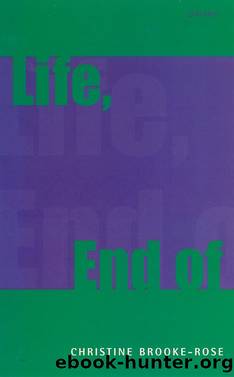Life, End Of by Christine Brooke-Rose

Author:Christine Brooke-Rose [Christine Brooke-Rose]
Language: eng
Format: epub
ISBN: 9781847775726
Publisher: Carcanet Press Ltd.
Published: 2012-01-15T00:00:00+00:00
In fact nobody speaks, as I said, which is where we came in. The character sees hears feels thinks. Not always in this pseudo-orderly authorial way, nor in this chaotic media-minded way, for who does? Unless heâs represented as having studied this topic, or being obsessed by it, or a bore with it, or any other reason that helps to shape his features for the reader. Apart from that no character is allowed to have an obsession or even an interest that canât arouse most readers. Look at Proustâs etymologist. Creating a bore without being boring is great art. Am I boring you?
A bit.
Here, moreover, the character is disabled. Is he old as well? Is he a he or a she? To know these and many other things, if the Author doesnât tell, the Dear Reader (the costly reader) must patiently construct the character from what he sees and thinks, bits and pieces, the way we do in life, but more difficult from that very fact, or wait till the author gets out of the characterâs mind and communicates something direct or from another viewpoint, the classic way, something, for instance, that the character doesnât know or isnât necessarily thinking at that moment. And if the Dear Reader isnât thinking it either he may skip. But then he may miss a piece of Fast Author Info (I call it FAI), that itâs a she, eighty years old, infirm, an ex-language teacher and literary theorist, or even a passionate amateur. If he hasnât already picked that kind of information from the characterâs mind. Here is some FAI about this tiny world, basically imprisoned in two rooms:
The author places himself inside the character. The author is a she. It so happens that the author here is very close to the character, even over-identifying with the two pillars of fire for feet and legs that jerk flinch wince and stagger but with the brain so far intact. And having fun with words and sentences as usual, each word and each sentence creating the next. But does the author have to fall? And could she write if she does?
This does make things difficult for this author. Who always prefers to invent, who is never the main character in a book, apart from a very brief autobiography written only to find out whether this renewed Narrative Sentence in an I-less present tense can work in autobio â it can and does, without any pronouns at all, moreover. And even more moreover, when the author is speakerless and authoritative as well as the main character in the book or almost, the quasi-shared disabilities seem to remove her authority as author, in theory at least. For itâs not done to talk or write of disabilities and death, although these are sometimes surprisingly interesting. Even with humour. Or of O.P.s. Things are getting very sticky so far.
Will this alter the narrative?
Who knows? Sheâs not a scenario-first kind of author. Remember one thing, though. Unless presented clearly as narrator, the character canât and doesnât write, the author can and does.
Download
This site does not store any files on its server. We only index and link to content provided by other sites. Please contact the content providers to delete copyright contents if any and email us, we'll remove relevant links or contents immediately.
Spell It Out by David Crystal(36110)
Professional Troublemaker by Luvvie Ajayi Jones(29651)
The Secret History by Donna Tartt(19058)
We're Going to Need More Wine by Gabrielle Union(19035)
Cat's cradle by Kurt Vonnegut(15339)
The Goal (Off-Campus #4) by Elle Kennedy(13657)
The Social Justice Warrior Handbook by Lisa De Pasquale(12187)
The Break by Marian Keyes(9358)
Crazy Rich Asians by Kevin Kwan(9280)
The remains of the day by Kazuo Ishiguro(8981)
Thirteen Reasons Why by Jay Asher(8894)
Educated by Tara Westover(8047)
The handmaid's tale by Margaret Atwood(7757)
Giovanni's Room by James Baldwin(7330)
Win Bigly by Scott Adams(7184)
This Is How You Lose Her by Junot Diaz(6877)
The Rosie Project by Graeme Simsion(6381)
Six Wakes by Mur Lafferty(6243)
The Power of Now: A Guide to Spiritual Enlightenment by Eckhart Tolle(5760)
